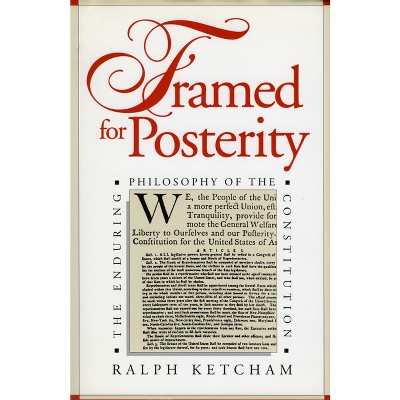Sponsored

Does Conquest Pay? - (Princeton Studies in International History and Politics) by Peter Liberman (Paperback)
$62.99Save $5.01 (7% off)
In Stock
Eligible for registries and wish lists
Sponsored
About this item
Highlights
- Can foreign invaders successfully exploit industrial economies?
- About the Author: Peter Liberman is Associate Professor of Political Science, Queens College, City University of New York.
- 264 Pages
- Political Science, History & Theory
- Series Name: Princeton Studies in International History and Politics
Description
About the Book
Can foreign invaders successfully exploit industrial economies? DOES CONQUEST PAY? demonstrates that expansion can, in fact, provide rewards to aggressor nations and suggests that the international system is more war-prone than many optimists claim.Book Synopsis
Can foreign invaders successfully exploit industrial economies? Since control over economic resources is a key source of power, the answer affects the likelihood of aggression and how strenuously states should counter it. The resurgence of nationalism has led many policymakers and scholars to doubt that conquest still pays. But, until now, the "cumulativity" of industrial resources has never been subjected to systematic analysis.
Does Conquest Pay? demonstrates that expansion can, in fact, provide rewards to aggressor nations. Peter Liberman argues that invaders can exploit industrial societies for short periods of time and can maintain control and economic performance over the long term. This is because modern societies are uniquely vulnerable to coercion and repression. Hence, by wielding a gun in one hand and offering food with the other, determined conquerors can compel collaboration and suppress resistance. Liberman's argument is supported by several historical case studies: Germany's capture of Belgium and Luxembourg during World War I and of nearly all of Europe during World War II; France's seizure of the Ruhr in 1923-24; the Japanese Empire during 1910-45; and Soviet hegemony over Eastern Europe in 1945-89.
Does Conquest Pay? suggests that the international system is more war-prone than many optimists claim. Liberman's findings also contribute to debates about the stability of empires and other authoritarian regimes, the effectiveness of national resistance strategies, and the sources of rebellious collective action.
From the Back Cover
Does Conquest Pay? demonstrates that expansion can, in fact, provide rewards to aggressor nations. Peter Liberman argues that invaders can exploit industrial societies for short periods of time and can maintain control and economic performance over the long term. This is because modern societies are uniquely vulnerable to coercion and repression. Hence, by wielding a gun in one hand and offering food with the other, determined conquerors can compel collaboration and suppress resistance. Liberman's argument is supported by several historical case studies: Germany's capture of Belgium and Luxembourg during World War I and of nearly all of Europe during World War II; France's seizure of the Ruhr in 1923-24; the Japanese Empire during 1910-45; and Soviet hegemony over Eastern Europe in 1945-89. Does Conquest Pay? suggests that the international systems is more war-prone than many optimists claim. Liberman's findings also contribute to debates about the stability of empires and other authoritarian regimes, the effectiveness of national resistance strategies, and the sources of rebellious collective action.Review Quotes
"An outstanding piece of multilingual historical and economic research in the service of social science."-- "Foreign Affairs"
"This close study of five major occupations (including the Nazi, Japanese, and Soviet empires) concludes that conquest pays handsomely. The costs are low; the benefits potentially large. This is a valuable analysis, of significance for strategic study of the 20th century, and of disturbing implications for architects of the current international system."-- "The Virginia Quarterly Review of History"
About the Author
Peter Liberman is Associate Professor of Political Science, Queens College, City University of New York.Dimensions (Overall): 9.22 Inches (H) x 6.15 Inches (W) x .76 Inches (D)
Weight: .89 Pounds
Suggested Age: 22 Years and Up
Number of Pages: 264
Genre: Political Science
Sub-Genre: History & Theory
Series Title: Princeton Studies in International History and Politics
Publisher: Princeton University Press
Format: Paperback
Author: Peter Liberman
Language: English
Street Date: August 23, 1998
TCIN: 94419740
UPC: 9780691002422
Item Number (DPCI): 247-09-5578
Origin: Made in the USA or Imported
If the item details aren’t accurate or complete, we want to know about it.
Shipping details
Estimated ship dimensions: 0.76 inches length x 6.15 inches width x 9.22 inches height
Estimated ship weight: 0.89 pounds
We regret that this item cannot be shipped to PO Boxes.
This item cannot be shipped to the following locations: American Samoa (see also separate entry under AS), Guam (see also separate entry under GU), Northern Mariana Islands, Puerto Rico (see also separate entry under PR), United States Minor Outlying Islands, Virgin Islands, U.S., APO/FPO
Return details
This item can be returned to any Target store or Target.com.
This item must be returned within 90 days of the date it was purchased in store, shipped, delivered by a Shipt shopper, or made ready for pickup.
See the return policy for complete information.
Frequently bought together

$18.88
MSRP $27.00
Buy 2, get 1 free select books, music & movies
4.8 out of 5 stars with 571 ratings

Highly rated
$25.40
MSRP $45.00
Buy 2, get 1 free select books, music & movies
4.7 out of 5 stars with 7 ratings
Trending Non-Fiction

$15.68
Buy 2, get 1 free select books, music & movies
4.8 out of 5 stars with 191 ratings

$19.31
was $20.98 New lower price
Buy 2, get 1 free select books, music & movies
4 out of 5 stars with 60 ratings

$19.58
MSRP $29.00
Buy 2, get 1 free select books, music & movies
4.6 out of 5 stars with 13 ratings

$4.59
MSRP $7.99
Buy 2, get 1 free select books, music & movies
4.8 out of 5 stars with 120 ratings

$6.20
MSRP $10.95
Buy 2, get 1 free select books, music & movies
4.8 out of 5 stars with 33 ratings

$7.09
MSRP $9.99
Buy 2, get 1 free select books, music & movies
4.9 out of 5 stars with 46 ratings









